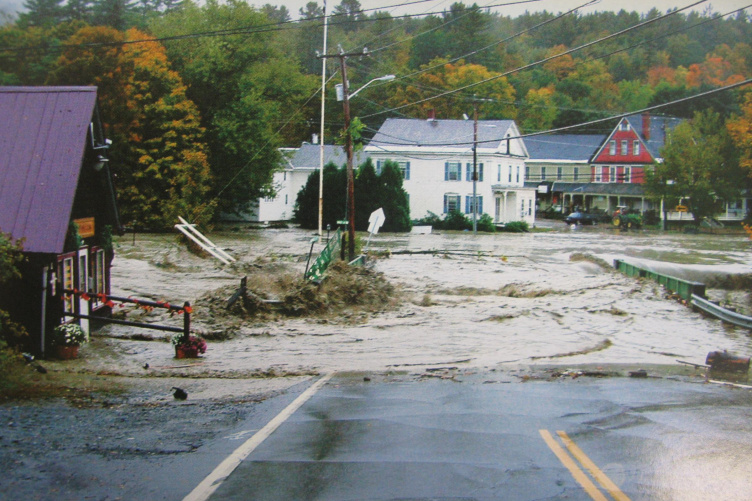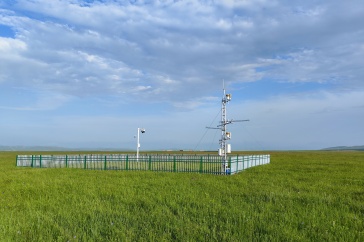
Flooding devastated Alstead, New Hampshire, in October 2005.

Since 2005, New Hampshire has experienced an increase in the frequency and severity of flooding: Heavy rains, high rivers, disaster spending and news coverage of flooding all set new records during this decade.
But new research from UNH has found that even in the counties most affected by flooding, people’s political ideology is the strongest predictor of whether they believe flooding has become more frequent. Among survey respondents overall, only 35 percent think that flooding has increased in the past 10 years. Among those who describe themselves as liberal, however, 48 percent said flooding had increased. Only 22 percent of conservatives agreed.
“Our research hypothesis was that the physical realities of flooding would be breaking through the political polarization we observe on anything related to climate change, but we found instead that people’s politics break through that physical reality,” says professor of sociology Larry Hamilton, who was lead author of the study, published recently in the journal Sociology. Such ideological responses, he says, are “another sign of the depth of divisions on climate change.”
“Even when people are in a place that experiences a specific weather event that can be linked to a changing climate, ideology is still the main predictor of what their response is going to be,” adds study coauthor Cameron Wake, research professor of glaciology and climatology at UNH and the Josephine A. Lamprey Professor in Climate and Sustainability.
“Even when people are in a place that experiences a specific weather event that can be linked to a changing climate, ideology is still the main predictor of what their response is going to be.”
Surveying more than 2,000 New Hampshire residents in 2015, the researchers asked respondents if they believe flooding in the past decade has increased compared to 20 or 30 years ago, if flooding is likely to increase in the future and whether they believe climate change is happening now and caused by human activities. The gap between liberals and conservatives is 26 points on the past-flooding question and widens to 43 points on the future-flood question, which hints more obviously at climate change. A 63-point gap yawns between liberals and conservatives on the most direct question about human-caused climate change.
The researchers were surprised by these results, despite Hamilton’s many studies showing that climate change — which scientists overwhelmingly agree is happening and is caused by humans — is as divisive a political issue as hot-button topics like gun control and abortion. “We thought perhaps that if science won’t convince people, nature will,” Hamilton says. Even in southern New Hampshire counties hard-hit by flooding in October 2005, Mother’s Day 2006 and Patriot’s Day 2007, responses fell along ideological, not geographic, lines.
What’s more, this phenomenon goes beyond New Hampshire: These survey results align with findings from a similar study in eastern Oregon, where warming summers have raised wildfire risks. “The political pattern is very similar” regarding beliefs about summer warming in the Oregon study, says Hamilton, who is a senior faculty fellow at UNH’s Carsey School of Public Policy. “I think it’s a widespread phenomenon.”
The findings, especially those on beliefs about future increases in flooding, concern the researchers, who fear that politicized beliefs will impede communities’ ability to prepare for New Hampshire’s climate future, which climate scientists predict will include more flooding.
“It is critical for those communities that are more at risk from flooding to start planning to become more resilient,” says Wake, who works with New Hampshire communities adapting to climate change as a member of the NH Coastal Adaptation Workgroup. “Clearly we have some work to do to bring the public along in that discussion.”
“Even widening culverts under roads takes some political support,” Hamilton adds.
Additional authors on the study are Thomas Safford, associate professor of sociology at UNH and a faculty fellow at the Carsey School; Joel Hartter, associate professor at the University of Colorado and a Carsey School faculty fellow; and Alli Puchlopek, a graduate student in sociology at UNH and research assistant at the Carsey School.
The University of New Hampshire Survey Center conducted all telephone interviews. The Carsey School of Public Policy provided logistical and administrative support. This research received funding from the New Hampshire Experimental Program to Stimulate Competitive Research (NH EPSCoR, funded by the National Science Foundation); the US Department of Agriculture National Institute of Food and Agriculture; Environmental Protection Agency; National Oceanographic and Atmospheric Administration; Ford Foundation; Neil and Louise Tillotson Fund; and at UNH the Carsey School of Public Policy, Sustainability Institute and the College of Liberal Arts.
-
Written By:
Beth Potier | UNH Marketing | beth.potier@unh.edu | 2-1566



















































